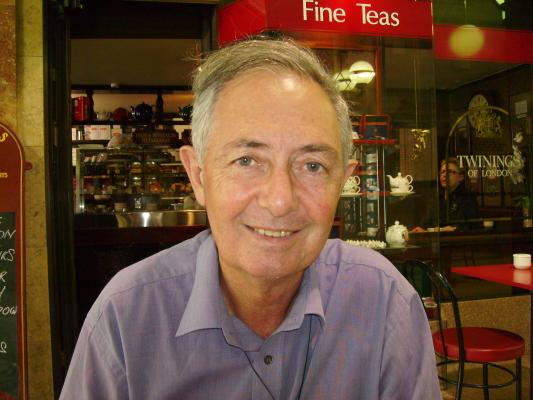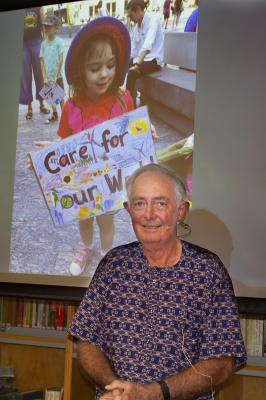Although we’ve known about the issue of climate for decades we’ve done little to fix it, Emeritus Professor Ian Lowe told a packed house of guests at Noosa Parks Association Friday Forum this month. Dr Lowe describes the current situation as a “climate crisis“ that needs urgent action.
“Humans are reaching the planet’s limit,” he said. “Every year there are more of us and we are consuming more. The economy is kept afloat by encouraging more spending. There are limits to what the natural system can absorb and supply.“
There is hope though with new sustainable technologies being developed and increasingly used around the world to enable people can live at the same level of comfort they do now, use a quarter of the energy they do now and at lower costs than fossil fuel-burning energies.
Formally educated in physics, the Griffith University professor has been working for the past 40 years on aspects of energy supply and use, especially environmental consequences such as climate change, as well as the broader issue of sustainable futures.
Thirty years ago the book The Greenhouse Effect outlined the issue but little progress has been made to solving climate challenges and the only significant change has been the halt of usage of ozone depleting substances with the result that the hole in the ozone layer is not increasing, he said.
“Climate change is only one of the environmental problems we face,” Dr Lowe said.
Fifty years ago the human population was about 3.7 billion. In 2020 it is about 7.8 billion. Humans and ruminant livestock now make up 96 per cent of animals on earth with only 4 per cent comprising all species of wildlife.
“We have a biodiversity crisis with mass extinction predicted by the end of the century,” he said.
“When a species goes extinct it has implications up and down the food chain.
“We don’t know enough about complex ecology to tell when whole ecosystems will collapse.”
Dr Lowe praised the way of life of the original Australians who he said worked out how to live sustainably in a harsh and unforgiving climate. They had a system that allowed them to live with sustainable practises in customs and system of law, but the way of life of original Australians has been permanently interrupted by our forebears through robbery with violence, he said.
To dispel the beliefs of climate deniers Dr Lowe said there had been significant changes of warmer and cooler periods throughout history but decades of scientific evidence show since the industrial revolution and the burning of fossil fuels global temperature have been increasing at an increasing rate.
The average temperature in Australia in most places is getting hotter with some central Australian areas warming as much as 2.5 degrees.
A CSIRO climate report released last week showed a record number of days when the mean temperature had increased 1degree with the trend increasing. It also showed the number of declared dangerous fire days had increased dramatically while rainfall has decreased 30 per cent.
The impact of climate change includes hotter days, more severe weather events, more category 4 and 5 cyclones hitting the Queensland coast, changes to growing seasons, greater fire risk, increasing sea levels and coastal erosion and changes to natural systems including wildlife migration to adapt to changing climates.
What will happen in the future?
Dr Lowe said if we get our act together and greenhouse emissions stabilise the most optimistic view is a 3 degree increase, the pessimistic view is “off the scale”.
“The task is to have a better than ever chance is to have a 2 degree increase,” he said.
“The world needs people to emit 45 per cent less emissions in 2030.”
If it doesn’t future impacts will be wide-reaching.
Deloitte accounting organisation predicts large impacts from climate change on the economy, particularly agriculture and tourism.
“We will need to adapt to hotter, drier weather and water conservation will become more important,“ Dr Lowe said.
There will be an increased risk of vector borne disease such as Dengue and Ross River fever, increased risk of heat stroke and pressure on mental health, especially in rural communities, he said.
On the plus side the recent CSIRO report indicated the costs of renewable power had reduced significantly and wind and solar power would decrease power prices for the individual.
Dr Lowe said South Australia’s investment in wind and solar power has demonstrated that previous beliefs they would only provide 25-30 per cent of power were “baloney“.
A NSW university study showed renewables were capable of supplying all our energy needs, he said.
SA will reach zero carbon by 2030 and save consumers $50 million.
“It can be done with political will,” he said. “Green energy is replacing fossil fuels around the world.“
Dr Lowe said on a global scale Australia was lagging behind.
President Joe Biden aims to rejoin the Paris agreement along with China. Australia will feel economic and social impacts if it doesn’t meet the same standards.
In western Europe it will not be legal to register a petrol vehicle in 2035.
To create change in Australia will require public pressure.
“If we want politicians to take action we have to step up and get them to take action,“ he said.
We will need better public transport and better planned communities enabling walking and cycling access to services, he said.
“We have to recognise unlimited growth is not possible. We have to stabilise human growth. If we care for our world the natural systems will give us what we need – breathable air, drinkable water, ways to produce food. If we don’t have that we won’t continue as a species, not only a civilised world.”
“Surveys show 80 per cent of Australians think we should be doing more for climate change. People want something better. Two fundamental problems are a political system corrupted by development and ideology that says the best future comes from trusting the market.“
In a way COVID has taught the world a couple of significant lessons that people can survive with much less material goods and governments have been forced to accept the word of scientists.



![[READER COMPETITION] – Win tickets to see Sharon and Slava Grigoryan present ‘OUR PLACE’](https://noosatoday.com.au/wp-content/uploads/2025/07/sharon-and-slavav-324x235.png)




